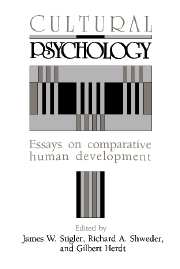Book contents
- Frontmatter
- Contents
- Preface
- Cultural psychology – what is it?
- Part I The keynote address
- Part II Cultural cognition
- Part III Cultural learning
- Part IV Cultural selves
- Part V Cultural conceptions of psychoanalysis
- Part VI Cultural domination and dominions
- 16 Male dominance and sexual coercion
- 17 The children of Trackton's children
- 18 Cultural mode, identity, and literacy
- 19 Mother love and child death in northeast Brazil
- Part VII A skeptical reflection
- List of conference participants
- Name index
- Subject index
18 - Cultural mode, identity, and literacy
Published online by Cambridge University Press: 05 June 2012
- Frontmatter
- Contents
- Preface
- Cultural psychology – what is it?
- Part I The keynote address
- Part II Cultural cognition
- Part III Cultural learning
- Part IV Cultural selves
- Part V Cultural conceptions of psychoanalysis
- Part VI Cultural domination and dominions
- 16 Male dominance and sexual coercion
- 17 The children of Trackton's children
- 18 Cultural mode, identity, and literacy
- 19 Mother love and child death in northeast Brazil
- Part VII A skeptical reflection
- List of conference participants
- Name index
- Subject index
Summary
The question that I address in this chapter is this: Why do some minority groups continue to experience difficulty in acquiring literacy? For the purpose of this essay, I define literacy as the ability to read, write, and compute in the form taught and expected in formal education. Put differently, I consider literacy to be synonymous with academic performance.
Theories of minority school failure
There are competing explanations of the lower school performance of some minority groups like Black Americans. One is the theory of inadequate genetic endowment. Jensen (1969), for instance, argues that because of genetic differences Black Americans not only perform lower than white Americans on IQ tests, but they also perform much lower than whites on those parts of the IQ tests requiring abstract reasoning and other cognitive skills associated with the higher academic performance of the whites. I have pointed out elsewhere (Ogbu, 1978, 1986) that the type of genetic differences that researchers have shown to exist between Blacks and whites do not warrant the type of generalizations made by Jensen. In addition, the so-called twin studies upon which much of Jensen's theory rests have now been called into question (Dorfman, 1978; Hearnshaw, 1979). Other theorists attribute the lower school performance to developmental deficiency. They argue that poor Black children grow up in home environments that do not provide them with the kind of early child experience that enhances the development of appropriate cognitive, linguistic, motivational, and social-emotional skills or competencies for school success (Hess & Shipman, 1967; Riessman, 1962; Hunt, 1969; Ramey & Suarez, 1985).
- Type
- Chapter
- Information
- Cultural PsychologyEssays on Comparative Human Development, pp. 520 - 541Publisher: Cambridge University PressPrint publication year: 1990
- 32
- Cited by



